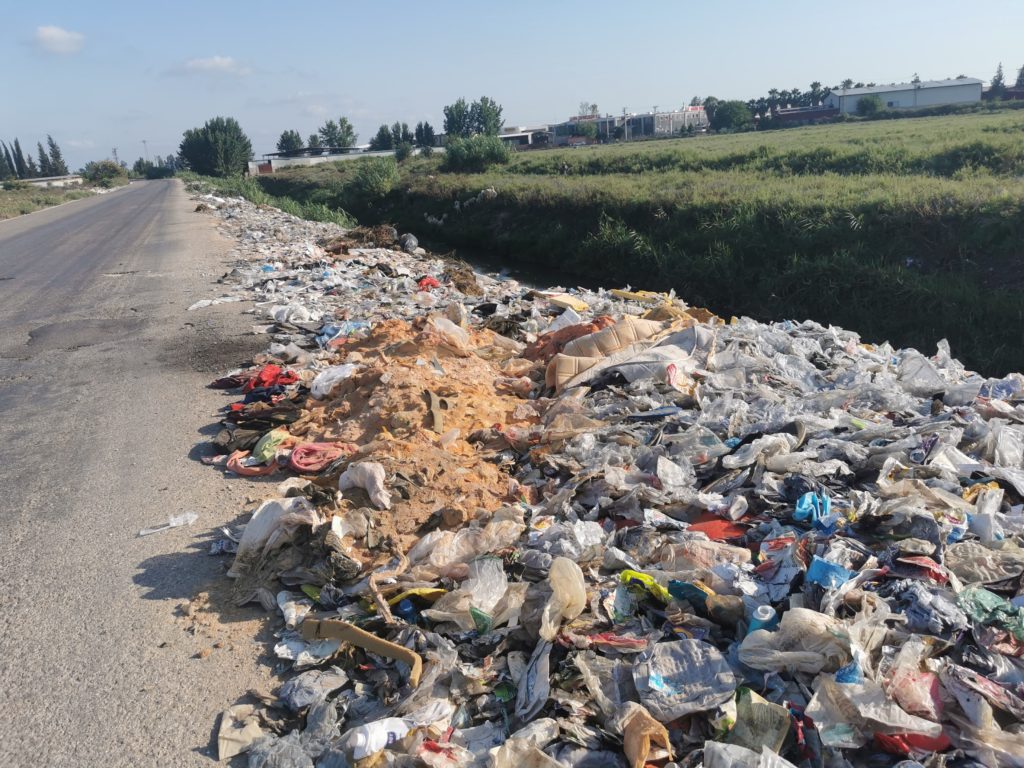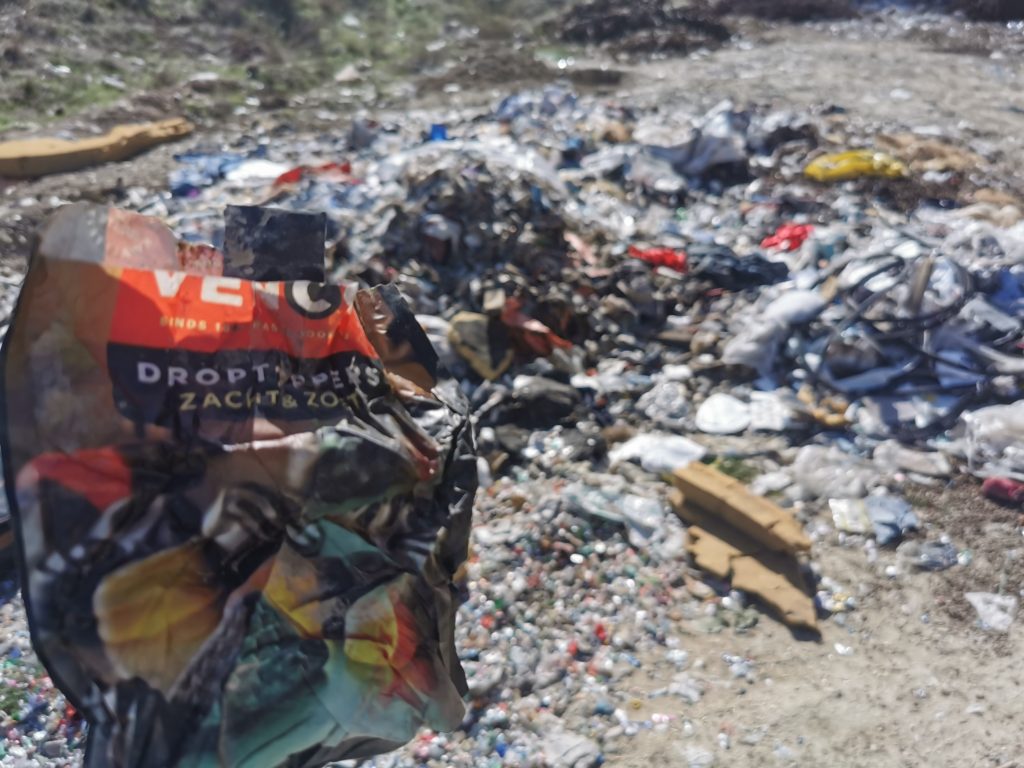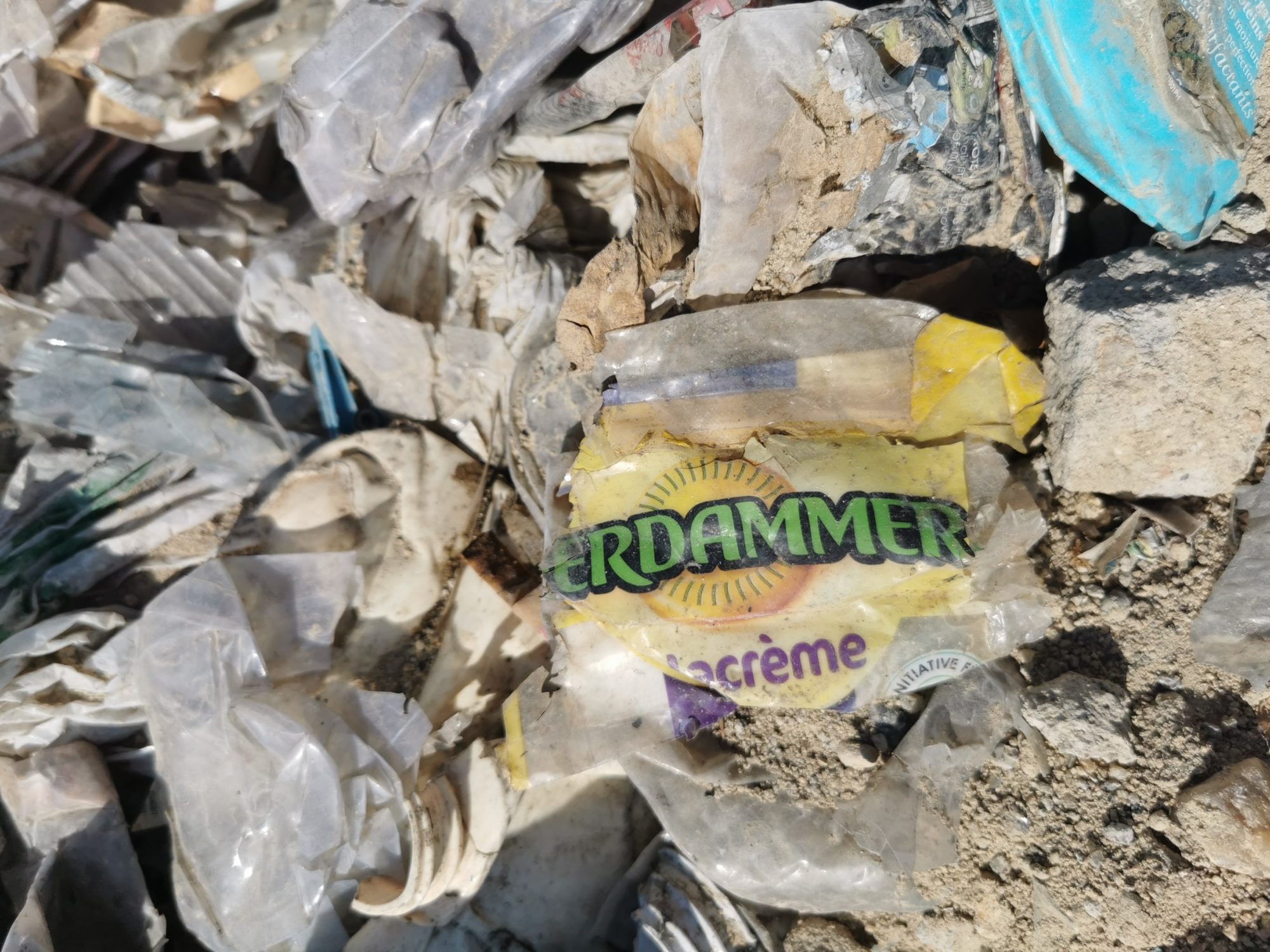An article by Suzanna de Vries, Suzanne Vink and Karlijn Stenvers for Politico.
A plastic package of Dutch cheese: Leerdammer. You would not expect to find that on an illegal dumpsite in the outskirts of Adana, one of Turkey’s biggest cities, close to the Syrian border. How did it get there? The Netherlands is exporting millions of tonnes of their plastic waste to Turkey to be ‘recycled’.
For European countries it is often cheaper to ship their waste to another country outside of the EU, than to deal with it themselves. For example: in 2021 more than 3 million tonnes of waste was exported from the Netherlands to Turkey. Turkey fails to manage the waste stream import. This is causing a steadily increasing amount of landfills, environmental issues as well as health problems.
Plastic waste is being dumped in Turkey illegally. The Netherlands is the leading country of all of the EU in terms of sending the biggest amounts of waste to Turkey. Whether it is in nature or within illegal landfills, you will find Dutch plastics.
The data contains information about the export and import of waste from European countries from 2004-2021. Every member state provides their own data by category, according to the definitions from Eurostat. The data is collected to give an overview of trade in waste by material and partner and to show the amounts (in mass unit) and the monetary value (in euro) of selected wastes that are shipped across intra-EU and extra-EU borders.
Waste paradise
Why and how is this still happening? Most of the plastic went to China until a few years ago, but since 2018 China has been blocking plastic waste imports at the borders. The import duty on plastic waste went up and China sends back poor-quality waste. Daniëlle Rebel is from the Inspectie Leefomgeving en Transport (ILT), the Dutch government institution that is responsible for the waste management. “There are certain perspectives of China out there of course”, says Rebel. “However, it remains safe to say that China is a great forerunner in recycling and properly processing these types of waste. But then they closed their borders in 2018, and producers had to look for other markets.”
According to Eurostat, the export of plastic waste from EU countries to Turkey has increased over the past three years. Turkey is part of the OECD, which means export rules are less strict than for Asian countries and just like that Turkey became the new waste paradise.
Sedat Gündoğdu is a marine biologist from Adana and focuses on marine plastic pollution at Cukurova University. According to him there are many reasons why Turkey accepts the import, but the most important one is ‘money’: “That means power.”

The European Commission has banned the export of all non-recyclable plastic waste to countries outside of the Organization of Economic Cooperation and Development (OECD) on 1 January 2020. The export of plastic waste is more strictly controlled now. In 2019 a total of 1.5 million tonnes of plastic waste from the EU was exported to Turkey, among other countries. The export of EU waste to non-EU countries reached 32.7 million tonnes in 2020. Recently, the environmental committee of the EU put out a recommendation to ban the export of plastic waste to countries outside of the EU.
Mislabeling garbage
It is forbidden to export non-recyclable plastic to countries outside of the European Union. But this stands in sharp contrast with reality, because most of the waste in Adana consists of non-recyclable products. This would imply that waste was exported illegally, being intentionally or unintentionally mislabeled. “Inside any container the waste could be mixed, for example with electronic waste, industrial waste, partly recycled waste and contaminated plastic. You never know if you don’t open the door of the container. You just know there is a label and you have to trust the papers’’, says Gündoğdu. He claims that the Netherlands has really bad waste management practices in terms of control.
On the level of control in waste management and the oversight of waste being exported to Turkey, Rebel responded saying this is unknown knowledge to their department. “It is interesting what Gündoğdu is saying, because this would imply serious offenses made by the Netherlands. It would mean that Dutch parties are intentionally misleading. If this is indeed the case, our department would like to have evidence of such offenses so we could investigate this further.”

Gündoğdu says there is a lack of transparency in the recycling industry. “There is no proper management system or control.’’ Because of this the precise value of plastic waste imports is not fully known. “The importers earn millions and millions of dollars. There is a lot of crime happening in the waste sector”, says Gündoğdu. Rebel stated that there are always inspections of the garbage when it is exported from the source, but “we are not posted on every corner of every street. There are always ‘cowboys’ in play.”
Dumping and burning
Although Turkey is a popular destination for Europe’s waste, the recycling programs are insufficient. Turkey already fails in recycling their own waste: around 90 percent of municipal solid waste ends up in landfills. European countries, like the Netherlands, are increasing the significance of the problem by exporting their waste to Turkey as well.
In Adana the consequences of the failing waste management are clearly visible. A lot of European waste arrives here, since the port of Mersin is close by. Gündoğdu and his colleagues mapped out the places where waste is dumped or burnt illegally in Adana, and they already found 29 spots in total.
As the amount of European waste has been increasing over the last couple years, the already existing landfills have become larger and new ones have emerged.
New landfill in Adana, Turkey (2018-2022)
Slide left or right to see the newly emerged landfill.
In addition to the increased amount and size of these illegal landfills, the residents close to recycling fabrics complain about health problems resulting from the smoke of burning waste. Gündoğdu, who lives in Adana: “It’s poisoning us.”
Sometimes the fires happen naturally because of the heat, but according to Gündoğdu there is also some suspicion about intentional burns, to get rid of the huge amounts of waste. “There are so many suspicious things. It has to be investigated properly.”
The consequences are not only major on land, but also in the sea. There is a widespread plastic leakage into the Mediterranean sea. “Millions of fish die”, according to marine biologist Gündoğdu.
Responsibility
The question of responsibility with the exporter and importer makes for a complicated dilemma. Rebel explains the Dutch perspective by saying that Turkey does claim to be able to process all the garbage that is being sent to them by the Netherlands. ‘’If Turkey does not inform us that non-recyclable plastic waste is being exported to their country, and they do not process a retrieval claim for that plastic with us, we cannot take any initiative.” Rebel states that “we cannot enforce the proper processing of waste recycling in Turkey, they have to do that themselves.”
The ILT gives no further insight into why so much of the Dutch plastic waste is continuously being sent to Turkey, in spite of the waste problem. They only proclaim that “as long as there is no export ban, it simply remains legal to send garbage over there.”
Ban on exporting waste
Recently, the environmental committee of the European Union put out a recommendation to ban the export of plastic waste to countries outside of the EU.
♻️ @EP_Environment adopted @WeissPernille revised rules governing shipments of waste to boost 🇪🇺 #circulareconomy, #resourceefficiency & #zeropollution goals
— ENVI Committee Press (@EP_Environment) December 1, 2022
⬆️76 ⬇️0 ↔️5
Details in the press release⤵️https://t.co/MEeekghAEK
But according to Rebel, there is no simple solution to solve this problem. She claims that it is almost impossible to predict the consequential steps that would be taken, were this ban to pass. ‘’Europe will be in for a very big challenge. For the Netherlands itself, managing the enormous amounts of waste within our own borders would not be achieved by restrictions on plastic production only. Not to forget that the process of passing actual restrictions on plastic production has been taking years already.”
“A ban would be a huge step and things will most likely change”, says Gündoğdu. But he does think there is only one real solution: reduce waste. “And if countries continue to produce plastic waste, they have to find a way to tackle this. They have to fix it in their own waste management, instead of exporting it to other countries.”

